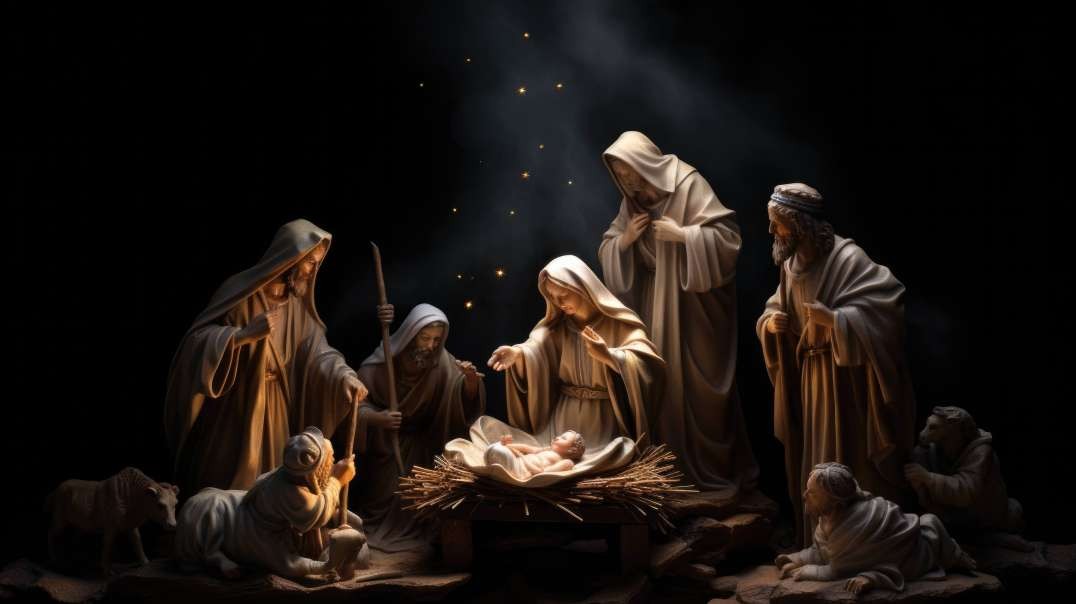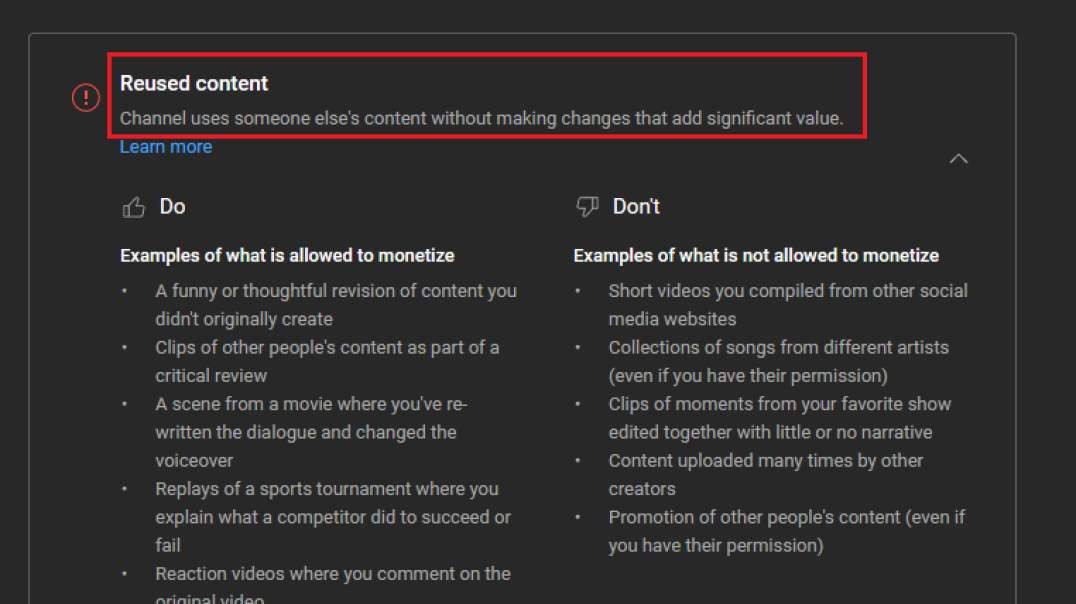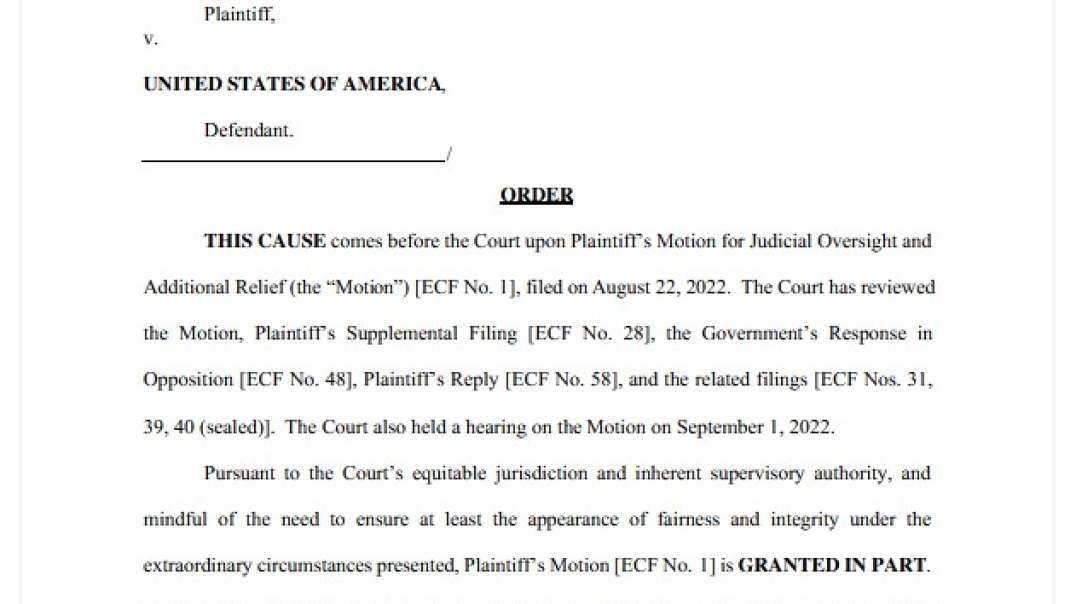The Werff Report
31 Dec 2021
A Special New Years' Message From Werff
29
0
As I continue to fight this harsh cold into the New Year, I wanted to drop in to wish each and every one of you a Happy New Year, and once again apologize for this horrible weak here at The Werff Report.
Laat meer zien





















God Bless you Werff and I've been praying for you. I hope you start feeling better asap. Happy New Year!!
Happy New Year!! We love you and yours. God bless you. Thank you in Jesus name. Praying for you.
Much love and I appreciate the gesture, but you are in for a surprise. The new year does NOT begin in the dead of winter! It begins in the spring when everything is blooming. Satan deceives the whole world remember (Rev 12:9). And by the VERY DEFINITION of the word, deceived, we don't KNOW that we are deceived!! A good Christian will pray they are not deceived.
“let there be lights in the firmament of the heavens to divide the day from the night; let them be for signs and SEASONS and for days and years”. Seasons = God's holy days
"There is a way that seems right to a man, But its end is the way of death." (Pr 14:12)
"We ought to obey God rather than men." (Acts 5:29)
"Whether it is right in the sight of God to listen to you more than to God, you judge." (Acts 4:19)
We are commanded to live by "every word that proceeds from the mouth of God" (Dt 8:3; Mt 4:4; Lk 4:4). God’s Calendar is no exception. It is an integral part of getting us to His Feasts at the appointed time. These same Feasts are observed in the New Testament by Jesus and His disciples. The apostle Paul instructed the Corinthian Church how to keep Matzot (Unleavened Bread) (1 Cor 5:7-8), and he himself kept Sukkoth (Acts 18:21), and Yom Kippur (Acts 27:9).
In the beginning, Yehovah gave us His calendar. Julius Caesar had his heyday with the Julian Calendar. Pope Gregory created the Gregorian calendar in 1582, and like anything else Catholic, it honors a plethora of PAGAN gods. The Hebrews have used the new moon SIGHTING to start the month at least since the time of the Exodus (Num [d]10:10[/d]; Ps 81:3; 1 Sam 20:5-20). By 135 AD, however, there were not many left in Jerusalem. Enforcement of the Roman religion had driven the Nazarenes underground and the Jews had been scattered nearly everywhere between the two diasporas of that time, the other occurring in 70 AD. It was reported that the Jews in Europe and elsewhere were observing the holy days at different times, so in 358 AD Rabbi Hillel II created the ‘Jewish fixed’ calendar. He used the astronomical calculations that were previously used to simply verify the New Moon sighting. It was a good idea for the time and made it possible for the disbursed Jews to keep the holy days at the same time. Sadly for them, God wants us to Feast at the PROPER TIME. (Ecc 10:17)
Originally, there were twelve 30-day months (Gen 7:11; 8:3). It rained for 40 days and 40 nights. But the water was on the earth 150 days, from the 17th day of the second month to the 17th day of the seventh month. Five months of 30 days = 360-day year! Currently, each month is 29.53059 days so Pope Gregory has some months that are 31 days to make up a 365-day solar year. A 360 day year would explain why the Egyptian, Assyrian, Persian, Babylonian, Chinese, and many other ancient calendars all have a 360-day year. It is most likely why the circle is 360 degrees.
It is also interesting to note that on the Mayan Ha’ab (agricultural calendar), the five extra days at the end of the year are called Way’eb were considered “unlucky”. Citizens born on one of these days were “doomed” to a life of misfortune and poverty. This is because some catastrophe caused the anomaly we have today.
There were cosmic disturbances around the time of the Exodus that likely caused the change in the length of the year. The Ipuwer papyrus was acquired by the Museum of Leiden, the Netherlands in 1828, and it closely matches the Biblical account of eight of the plagues. Ipuwer was a high priest in Heliopolis during the late twelfth dynasty. He recorded what he saw during the Exodus on a reed papyrus.
What we are eventually going to see is that God gives Moses a NEW Calendar right AFTER the plagues...
More disturbances:
“Mount Sinai was completely in smoke because Yehovah descended upon it in the fire. Its smoke ascended like the smoke of a furnace, and the whole mountain quaked greatly…” (Ex 19:16-19).
“The earth shook; the heavens also dropped rain at the presence of God; Sinai itself was moved at the presence of God…” (Ps 68:7-8).
"When Israel went out of Egypt...The sea saw it and fled; Jordan turned back, The mountains skipped like rams, The little hills like lambs" (Ps 114:1-8).
"The Talmud and Midrashim describe the Mountain of the Lawgiving as quaking so greatly that it appeared as if it were lifted up and shaken above the heads of the people; and the people felt as if they were no longer standing securely on the ground, but were held up by some invisible force." (Cf. Ginzberg, Legends, II, 92, Velikovsky, Worlds in Collision p.95)
God's Calendar
During the Exodus (1495-1491 BC), the eighth plague consisted of hail that “struck all that was in the field, both man and beast; and the hail struck every herb of the field and broke every tree...” (Ex 9:25).
“…now the flax and the barley were struck, for the barley was ‘in the head’, and the flax was in bud” (Ex [d][d]9:31[/d][/d]).
The old King James uses the phrase ‘in the ear’. That phrase is the word ‘Abib’. Strong’s # 24 – “head of grain, already ripe, but still soft, green ears”.
Then God tells Moses: “This month shall be your beginning of months, it shall be the FIRST MONTH OF THE YEAR to you” (Ex 12:1).
God then instructs them to take a lamb on the 10th day of the month, kill it on the 14th day of the month at beyn ha’Arbayim (twilight). Then He says: “you shall keep the feast of unleavened bread you shall eat unleavened bread seven days, as I commanded you, at the time appointed in the month of Abib” (Ex [d][d]23:14[/d][/d]-15).
“The Feast of Unleavened Bread you shall keep. Seven days you shall eat unleavened bread, as I commanded you, in the appointed time of the month of Abib; for in the month of Abib you came out from Egypt.” (Ex [d]34:18[/d])
All these verses tie the state of the barley to the first month of the year. Deuteronomy 16:1 plainly says: “Observe the month of Abib”.
For the 1850 years before Hillel’s fixed calendar, the barley was watched for ripeness in order to start the year. It needs to be in the state of Abib: ripe enough for the wave sheaf offering on the 16th day of Abib. (Ex [d][d]23:14[/d][/d]; Luke 6:1; Josh 5:10-12; 2 Chr 35:14). Once the barley is in the state of Abib, we start looking for the new moon because the New moon starts the month. In fact, the Hebrew the word for new moon and for month are the same word, ‘Chodesh’ (חֹדֶש).
Now, if we read Gen 1:14: “let there be lights in the firmament of the heavens to divide the day from the night; let them be for signs and SEASONS and for days and years”.
The word ‘seasons’ here is the Hebrew word ‘moadim’ Strong’s #4150 – םוֹעֵד - “meeting, appointed time, season, solemn feasts”.
The Tanakh translates it ‘Festivals’ in that verse. The LXX uses the word 'kairos' (Strongs # 2540) "proper time, appointed time".
Psalm 104:19 plainly says “He appointed the moon for festivals” - Hebrew Tanakh.
Num [d]10:10[/d] says: “…at the beginnings of your months you shall blow the trumpets (Shofars)”
Ps 81:3 says: “Blow the trumpet at the time of the New Moon, At the FULL MOON on our solemn feast days”
Since the journey of the moon from conjunction (no moon) to opposition (full moon) is 15 days, that puts the feast of Unleavened Bread and the Feast of Tabernacles on the 15th day of the month just like God commanded (Lev 23:6-8, 39-44). (If you start counting from the sighting of the crescent, the moon is actually a little past full).
David tells Jonathan: “Indeed tomorrow is the New Moon, and I should not fail to sit with the king to eat” (1 Sam 20:5)
New moon festivals were observed by the Hebrew people (Num 29:6; 2 Ki 4:23; Eze 46:6; Hos 5:7; Amos 8:5) and will still be observed by every follower of Yehovah, even into eternity (Col [d]2:16[/d]-17; Isa 66:21-23).
So, here it would have to be the 30th day of the month and David said: "tomorrow is the New Moon". He said this with certainty because it had not been sighted the previous evening. On the lunar calendar, the month can only be 29 or 30 days. The moon comes out just before sunset. If you can't see the visible crescent by the eve of the 29th day, it's a 30 day month.
In v. 18, again, Jonathan tells David: “tomorrow is the New Moon and your seat will be missed”. Here David was trying to find out if King Saul wanted to harm him. He then hid out for a few days to see what king Saul would say.
Anyway, here’s the clincher: (v. 27) says: “and it happened the NEXT DAY, the SECOND DAY OF THE MONTH, that David’s place was empty” Here we see the new moon tied to the first day of the month.
Jewish "fixed" calendar:
In 70 AD, the Roman General Vespasian and his son Titus besieged Jerusalem and destroyed the Temple. In 135 AD Simon bar Kokhba led a rebellion against Rome, was subsequently defeated and the remaining Yehudim were exiled, not to return until 1947. Rabbi Hillel II had a good idea for the time being. He took the astronomical calculations that were used to verify the crescent sighting, or because it was cloudy, and he just fixed the calendar 6000 years in advance. That way, everyone who had been scattered abroad, could all observe the holy days at the same time. The problem is that the calculations are based on the Molad (conjunction), which is 14 to 24 hours earlier than the actual sighting.
Note: since the moon comes out right before sunset, the day following the crescent sighting (which begins immediately at sunset) is the 1st day of the month. A day begins at sunset (Lev 23:32; Gen 1:5, 8, 13, 19, 23, 31).
Today, with the advent of telephones, faxes, texts, and emails the Hebrew calculated calendar is not only unnecessary, but it causes millions to arrive for God’s holy days early, which is a sin. Since the New Moon should be sighted in Israel, and they are 9 hours ahead of us, this gives 9 hours to prepare for Yom Teruah or a New moon dinner.
God tells us to BE CAREFUL to come at the appointed time. (Num 28:2; 9:23; Lev 23:4; Ex [d]34:18[/d]; [d][d]23:14[/d][/d]-15; 13:4-10).
God also tells Moses: “Tell Aaron your brother not to come at just ANY TIME into the holy place, inside the veil, before the mercy seat, lest HE DIE” (Lev 16:2).
“The wages of sin is death”(Rom 6:23) …case closed.
Besides, we are supposed to seek Yehovah at a time when He may be found”. What if you had made a lunch date with your Dad on Thursday, but you showed up on Tuesday. You both would be sitting by yourselves.
Days of the week
Scriptural name. Pagan name. Roman name.
1. Yom Echad - Deis Solis (day of the sun) - Sunday
2. Yom Sheni - Dies Lunae (day of the moon) - Monday
3. Yom Shlishi - Tiwe’s day - Tuesday
4. Yom Revi’i - Oden’s day - Wednesday
5. Yom Chamishi - Thor’s day - Thursday
6. Yom Shishi - Freyjja’s day - Friday
7. Yom Shabbat - Deis Saturni (Saturn’s day) - Saturday
Pagan months
1) Janus – Roman god of doors/gates.
2) Februa – Roman festival of ritual purification
3) Mars – god of war
4) Aprilis – fertility goddess
5) Maia – mother goddess
6) Juno – wife and sister of Jupiter
7) Julius Caesar
8) Augustus Caesar
9) Septo – prefix meaning 7 (corresponds to 7th Biblical month).
10) Octo – prefix meaning 8
11) Nova – prefix meaning 9
12) Decca – prefix meaning 10
Biblical months
Proper name. Verse. Jewish names.
1. Abib/ Nisan - Ex [d][d]9:31[/d][/d]; Est 3:7 - Nisan
2. Ziv - 1 Ki 6:1 - Iyar
3. Sivan - Est 8:9 - Sivan
4. ? - Jer 39:2 - Tammuz
5. ? - 2 Ki 25:8 - Av
6. Elul - Neh 6:15 - Elul
7. Ethanim - 1 Ki 8:2 - Tishri
8. Bul - 1 Ki 6:38 - Chesvan
9. Chislev - Zec 7:1 - Chislev
10. Tebeth - Est [d]2:16[/d] - Tevet
11. Shebat - Zec 1:7 - Shevat
12. Adar - Est 3:7 - Adar
Notice that there are no proper names for the 4th and 5th months in the Bible. Originally there were no names for ANY of the months except 'Abib' which is the first month (Ex [d][d]9:31[/d][/d]; Dt 16:1). If the barley is not going to be ripe enough for the wave sheaf offering on the 16th of Nisan, then a 13th month is added called Adar II.
Question: If septo means 7, then why is September the name of the 9th month on the pagan calendar?!
Answer: It points us to the 7th month on God’s calendar! The 7th Biblical month of Tishri is usually in September or early October.
Same with the 10th, 11th, 12th months! Their prefixes do not match their ordinal positions.
It is amazing that God left us a remnant of truth in the Pagan calendar that points us back to His Calendar!
We have been unwittingly duped into honoring these pagan gods: Janus, Mars, Juno, etc. We are not even supposed to make mention of these strange gods (Ex 23:13; Ps 16:4)....unless it is "good for necessary edification" (Eph 4:29), or to function in the world I suppose, i.e., go to work, make appointments, etc.
God divorced Israel for following those false gods (Jer 3:8). So, because Satan is crafty, the names of these false gods are now changed slightly and people call on them every day.
“Truly, these times of ignorance God overlooked, but now commands all men everywhere to repent,” (Acts 17:30)
May God bless you and your family and The Werff Report richly as you put out your videos and share GOD with the world. May God touch your body now and take this infection out of your body in the name of the Lord Jesus Christ.
Thanks Werff...!! And no worries. We appreciate all you do!! God bless you in this new year..and all the viewers as well! God bless America